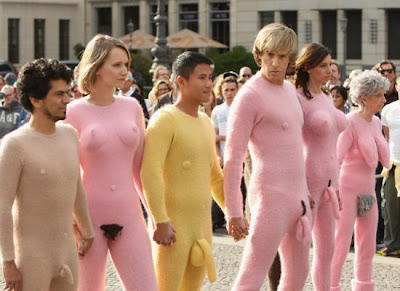I recently came across a couple of pieces by writer Nick Alimonos on his blog The Writer’s Disease. And given a number of things which have been happening recently they make some sense (although I don’t agree with everything he says).
These first two quotes are from the article Nudity is the Future from April 2013.
I recently had the fortune to read an article in Cracked, “The Five Craziest Ways Men Have Censored Female Sexuality” … what really stood out for me was how Islamist countries like Iran fight to repress human nature. Censors paste cartoon shirts on all of the female characters on the show Lost, because tank-tops are just too arousing. Even things we would never consider sexual, like a man and a woman sitting on a couch or the bulge of a woman’s blouse, is deemed unacceptable. Iranian censors will even blur a closeup of a woman’s face. No matter how many things the Iranian government tries to omit from TV and movies, boys will find something to be aroused by, because sexual desire comes from within … Trying to repress this instinct is a lost cause. It’s plugging up a pressure cooker bound to explode. The irony is that, by making everything taboo, everything becomes a forbidden fruit. Essentially, Iranian censors are creating the sex crazed society they are trying so desperately to prevent … The battle against free information cannot be won, as history has proven again and again. The only recourse is acceptance, and acceptance is a good thing, because human nature is in the right. Honest, open, free information results in the good of any society. As nudists, we find nothing inherently sexual … so that the act of sex develops naturally, by getting to know a person as a person.
The Internet is changing more than Islamic society, however; it’s changing ours as well. The last irrational, moralistic taboo in America is that of public nudity. There is no difference between an Iranian woman being arrested for going out in the streets without her hair covered and an American woman being arrested for stepping out her front door without a top on. Nobody can give a rational explanation for anti-nudity laws. The government uses, instead, abstract terminology like “disturbing the peace” or “public indecency”. Without realizing it, we criminalize nudity on strictly moral grounds, based on ancient and outdated religious biases that have no place in a modern society.

And these three are from a piece on Alimonos’s philosophy of Naturism.
As Americans, we live in an insane world, where you can legally carry and conceal a gun, but risk imprisonment should anyone see your genitals.
I reject the notion that men and women cannot live in sight of one another without clothes. I reject the belief that bodies are inherently sexual and must be hidden from view. And I know, with certainty, that nudity is not harmful to children — in fact, quite the opposite is true — shaming our kids, making them believe that their bodies are sinful, harms their self-esteem and their sense of identity.
For tens of thousands, if not more than a hundred thousand years, mankind was oblivious to nakedness. After the Ice Age, we adopted textiles to retain heat, but at some point in our history, an invention of necessity became a global neurosis, a hatred for our own bodies.
It seems to me that there is a large amount of common sense there even if some of Alimonos’s views (not really represented here) do support the patriarchy more than one might like.





 These final two items may not be safe for those of a pathetically puritanical mind; they are included here in the interests of normalising our attitudes to sex and sexuality.
These final two items may not be safe for those of a pathetically puritanical mind; they are included here in the interests of normalising our attitudes to sex and sexuality.




